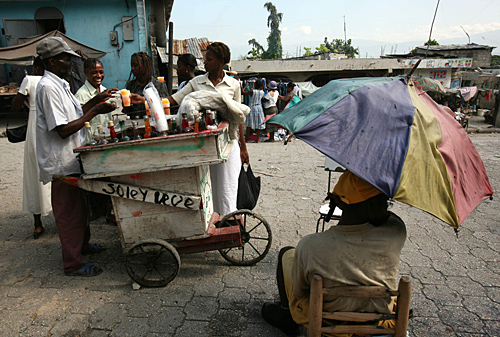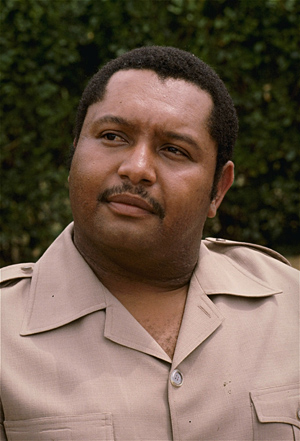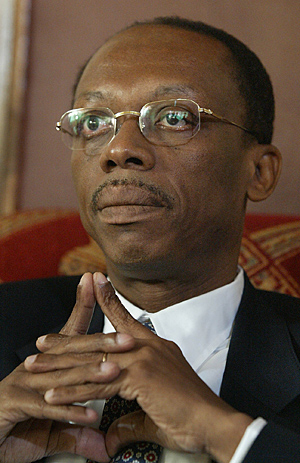Former Haitian Leaders Begin to Stir |
|
 |
|
Ariana Cubillos/AP |
|
| A vendor in Port-au-Prince, the capital of Haiti, sells a snow cone. People in the Caribbean nation are enjoying a respite from violence for the first time in decades. |
| Want to send this page or a link to a friend? Click on mail at the top of this window. |
More Special Reports |
| Posted September 3, 2007 |
Former Haitian Leaders Begin to Stir |
|
 |
|
Ariana Cubillos/AP |
|
| A vendor in Port-au-Prince, the capital of Haiti, sells a snow cone. People in the Caribbean nation are enjoying a respite from violence for the first time in decades. |
By Carol J. Williams, |
Los Angeles Times Staff Writer |
| A deposed dictator and an exiled president are finding wistful backers. And others now down can't be counted out. |
PETIONVILLE, Haiti — Out of sight, out of mind and now out of money, former Haitian dictator Jean-Claude "Baby Doc" Duvalier has been quietly sounding out the possibility of returning home after 21 years in exile in France.
Former President Jean-Bertrand Aristide, still visible and sufficiently flush to fuel his promotional machinery from South Africa, nurtures the hopes of his supporters that he will one day come back to lead this country.
Forced out click to enlarge
Fled click to enlargeCloser to home, three coup leaders and an ex-president live in the shadows, aging and ostracized but not to be counted out in the seemingly boundless potential for political disruptions in Haiti.
Even as Haitians enjoy a respite from violence for the first time in decades, political forces given up for dead are showing faint stirrings of life. Some analysts dismiss the phenomenon as irrelevant musings of yesterday's men, but others point out that history here tends to repeat itself.
Nostalgia for the Duvalier era has made itself apparent in recent months with the establishment of the Francois Duvalier Foundation preserving the memory of the exiled Duvalier's late father, a celebration of what would have been the elder tyrant's 100th birthday in April and a sellout memoir of the president-for-life titled "The Misunderstood."
 |
Kathy Williams/AP |
| Jean-Claude "Baby Doc" Duvalier inherited power from his father but forced to flee in 1986. |
"More and more people are talking about the Duvalier period with positive memories," said Daniel Supplice, a teacher and historian who was a childhood friend of and political aide to the younger Duvalier, who fled to France in 1986 as pro-democracy forces fanned international condemnation of his human rights abuses.
"When Jean-Claude left, the population expected changes for the better," Supplice said. "On the contrary, things have only gotten worse."
Rural Haitians were removed from much of the repression trained on dissidents in the cities, so they felt little benefit from Baby Doc's departure and "couldn't care less about so-called democracy," he said.
"I've heard that Jean-Claude wants to return, maybe not as president but as a citizen," said Rony Gilot, who was Baby Doc's information minister and wrote the recent biography of the father.
"The Misunderstood" sold out its initial 1,000 copies within days of its February release, and a larger second printing is due out soon. Gilot, who still talks to the 56-year-old Duvalier in Paris by phone every few months, attributes the unanticipated interest in the late dictator's story to a nostalgia for a lost sense of order and national pride, but not for the stifling of personal and political freedoms.
Gilot likens the newfound reflection on the Duvalier era to postwar Germans and Italians longing for the punctual transportation and crime-free streets they had under fascism.
Jean-Claude Duvalier inherited the presidency in 1971 after the death of his father, a country doctor who won a rigged election in 1957 and had himself proclaimed president-for-life seven years later. After Baby Doc fled to the French Riviera with untold millions from Haiti's coffers, Gen. Henri Namphy oversaw corrupt elections that brought the French-educated academic Leslie Manigat to the presidency in January 1988.
Four months later, Namphy ousted Manigat, only to be toppled himself before the year was out by Gen. Prosper Avril.
Avril embarked on a renewed campaign of repression, ordering the arrest and beating of political opponents and parading the bloodied men on national TV. As violence rose and a state of siege ensued, Avril was forced to resign and give way to the nation's first democratic elections since it became independent in 1804.
Aristide, then a priest renowned for rousing oratorical powers, won the presidency in a landslide but served only seven months in 1991 before Duvalier loyalists in the military and the disgruntled business elite conspired to back another coup, led by Gen. Raoul Cedras, who took over the helm as the coup-plotters' puppet.
 |
Schalk van Zuydam/AP |
| Jean-Bertrand Aristide, an ex-priest, fled abroad twice. |
After three years in exile, Aristide returned on the heels of a U.S.-led military invasion that chased Cedras into exile. But turmoil persisted, and Aristide armed slum gangs that attacked his opponents. The violence led to the return of exiled former military figures and betrayed gang leaders in a rebellion. Aristide was sent into a second exile, this time to Africa, in February 2004.
Cedras, 58, lives in obscurity on a Panamanian island, unlikely to return because of a prison sentence imposed in absentia for his alleged involvement in a massacre.
Namphy, 74, was last known to be taking refuge in the neighboring Dominican Republic.
The whereabouts of Avril, 69, are unknown since his escape from prison in the chaotic aftermath of Aristide's flight three years ago. Manigat, 77, came in a distant second in his bid for the presidency last year.
What, if any, political ambitions these men might nurture remain a mystery, but Aristide openly aspires to returning and reigniting his following.
"He is in good spirits because he knows he will come back and that we are fighting for that," said Maryse Narcisse, one of five directors of the Aristide Foundation, which bankrolls student stipends, aid for activists with his Lavalas Movement and political agitation for his repatriation.
Nearly 1,000 supporters marched on Aristide's 54th birthday in July to demand his return -- a shadow of the throngs that once backed the charismatic populist, but still a force for the fragile government of President Rene Preval to reckon with.
When pressed by Aristide supporters to invite him back, Preval has pointed out that there are no impediments to his predecessor and onetime mentor's return -- except the former president's own concern about pending charges of criminal drug trafficking and misuse of government funds while in office.
Apart from the Aristide activists and Duvalier's revitalized contingent, few Haitians pay much heed to the aging former leaders. Four teenage boys washing cars at a parking lot in this upscale suburb of Port-au-Prince said they knew nothing about the former dictator in France and shrugged when asked about Aristide's future.
But independent analysts said that any blast from Haiti's troubled past could endanger the country's fragile peace.
"I don't think there's any question that return of either of them would be disruptive at this point," Mark Schneider, Latin America analyst for the Brussels-based International Crisis Group, said of Aristide and Duvalier. "We've only had one year of permanent elected government after the transition period, and it seems to me it would be quite unfortunate for them to arrive and create rumors that would inevitably disrupt the security situation."
Copyright 2007 Los Angeles. Published Sunday, September 2, 2007.
| Wehaitians.com, the scholarly journal of democracy and human rights |
| More from wehaitians.com |